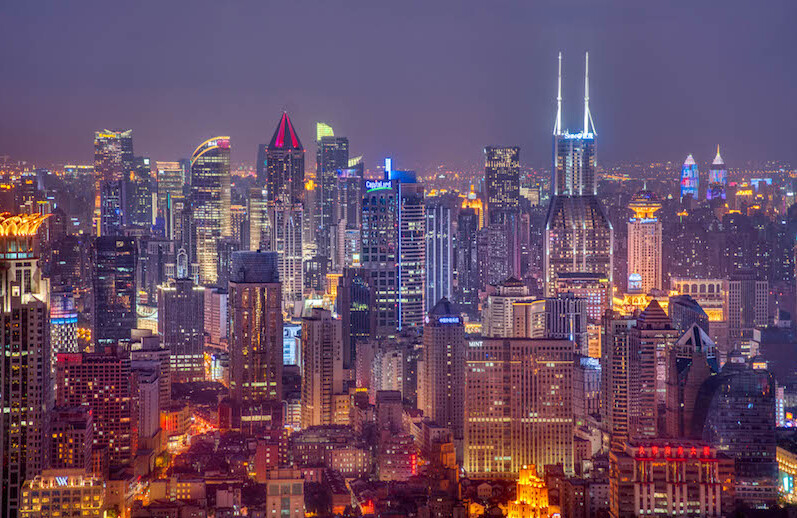Is China becoming an immigrant society? Why do foreigners move to the country? What can we learn by studying Shanghai's international community? James Farrer, a professor at Tokyo's Sophia University, has interviewed over 400 migrants to China looking to answer these questions. He and Senior Fellow Devin Stewart discuss immigration's impact on Chinese culture and whether foreigners can ever really fit in.
DEVIN STEWART: Hi. I'm Devin Stewart here at Carnegie Council in New York City. This is Asia Dialogues, probably the last episode of this particular podcast, as we are winding down some of our projects here at Carnegie Council, but you will probably see me in other channels on other podcasts doing similar themes in the future.
For the final episode here, I'm very, very happy to have my old friend James Farrer, who is a professor at Sophia University in Tokyo, Japan. James and I have collaborated on many projects on U.S.–Asia relations, including a 2008 conference in Tokyo "The Right to Move" on global migration, which is a very appropriate topic for us today.
James, first of all, it's great to celebrate the last episode with you today.
JAMES FARRER: It is for me, too. It's kind of sad to know that this great series is ending, for now at least, but it's a real honor to be here as your final guest on this series.
DEVIN STEWART: Our pleasure, James.
The reason why the theme of migration is so appropriate for us today is because not only is this kind of the grand finale episode of Asia Dialogues—
I want to brag for a second. Asia Dialogues has been around for the past three and a half years or so at Carnegie Council, funded by the Henry Luce Foundation. We've hosted more than a hundred guests speaking about Asia in just that time alone. I personally have been involved with hosting Carnegie Council podcasts since around 2007. So there's a lot of background there. We've touched on a lot of themes throughout the years.
The reason it's so timely today is that James has put out a brand-new book that's on the theme both of migration and on Asia, specifically China, which has been increasingly one of our areas of focus these days. His new book, published in 2019 by Routledge, is called International Migrants in China's Global City: The New Shanghailanders. This is a new book that is drawn from James' decades of experience in China, as well as more than 400 interviews that he has conducted in China with people who have moved to China, looking at various communities there and the experience of being a migrant in China.
James, give us a little sense of the book. Interviewing 400 people, I know from experience, is quite an experience. You can really get a lot out of that. Tell me a little bit about what was involved with putting this book together.
JAMES FARRER: This book really started a very, very long time ago for myself, 20 years ago, when I was doing research on China. I went to China to do research on youth culture and sexuality, wrote about Chinese nightlife, a lot of other topics about China.
In the process, though, as I have spent so many years living in China and going to China, I met a lot of people who had moved to China. When I first started meeting these people, I thought This is really a big change. China has sent abroad millions of Chinese migrants to all over the world, and yet, for the first time perhaps in a very long time, maybe forever, China is becoming a place where people want to go.
No one had really written about this. And I thought Is China becoming an immigrant society? Why does China want migrants? What do they do for China? What does China do for them? So a lot of questions came out.
When I started it, I thought this would be a tiny little community, a sort of small study, but in the process of doing this, China had globalized and China became a global power and this migrant community became quite large compared to what it had been. That's the background.
So I did a lot of interviews. Some of the people I've interviewed over 20 years, so I met them 20 years ago when they were students—25 years ago when they'd just got there—and I've followed them as they dated and fooled around and partied and met their partners, started businesses, had children, became rich. I really saw this community develop from a very close angle.
DEVIN STEWART: It seems like you're arguing that China's elevated position in international affairs, but also in the international economy, perhaps the number two economy already—it depends on how you measure it; it may be number one already even in the world—is there a difference in the motivations for people to move to China?
JAMES FARRER: I think people moved to China always. I think in the 1980s—and I've interviewed people who have been going to China since the 1970s actually since the 1980s and 1990s—and I think that certainly in the 1980s people went to China mainly because they were interested in China. They were Chinese studies students, they were learning the language, they were interested in the culture, they wanted to help out China, they wanted to see China.
By the 1990s, people were going there to do business. I think the 1990s was the era when you saw a lot of companies sending people over. This is the classic expatriate story. I think that these were corporate people. This was a small number of migrants. At first, I thought The small number of migrants is not a really significant story.
But when you look at what those migrants did, they really not only created companies in China—they created companies like Apple in China or Coca-Cola in China, or Procter & Gamble or Siemens—but they actually transformed Chinese society. These were people who I think are not usually thought of as transformers, as agents of social change, but they were.
When I really think about the story of this small number of migrants who came to China from the 1990s all the way to the 2000s, these were in a sense institutional people. But that's why they had so much influence, because as migrants they brought with them a lot of resources. They actually transformed not only the Western enclaves within China, but actually created all sorts of mobility channels for Chinese people. I think that's the bigger story in a way. So the migrants not only transformed opportunities for themselves and for the companies they were working for, but they created enormous mobility opportunities for Chinese people following them. These are mobility opportunities that go beyond economics actually.
DEVIN STEWART: Can you explain what a mobility opportunity is?
JAMES FARRER: Yes. I think you have to think of mobility as two types of things.
One is just spatial mobility. So when a foreign company comes to China—like, say, I interviewed guys working for the early aircraft companies—they literally do mobility. Japan Airlines and United came and hired Chinese people. A lot of these people were able to travel, develop careers, move abroad. That's just a small example. But there are thousands and tens of thousands of these types of stories. That's a geographic mobility.
But there's also mobility within a field. So what these people not only created were spatial mobility channels but career mobility channels. This would be the chance to move within a profession as a Chinese person.
One executive from the United States is creating mobility channels for thousands of Chinese people within those fields. Those included various economic fields, but also educational fields for example—I also look at education as a field—but also fields of social relationships, networks of friends; that's another type of social field. And also sexual fields, fields of intimacy—meeting people, hooking up with people, marrying people—the sexual field is also a field of mobility.
When I thought about all those different social fields, I began to see that this type of migration actually has a huge impact on the receiving society far beyond the numbers of people who go there.
DEVIN STEWART: Interesting.
Before we talk about some of the themes that come out in your interviews of people who have moved to China, let's just get also who we are talking about here. What are the biggest countries that are sending migrants to China?
JAMES FARRER: I want to be clear my study is an ethnographic qualitative study, so it's based on interactions with these people, people I've known very well, but it's a very big qualitative study.
What I look at is a pretty good cross-section of the migrants to Shanghai, which is one city. Shanghai is a city a bit like New York in a way—it's a city of finance, it's a rich city—but, unlike New York, Shanghai only takes in really the sort of elite migrants. We'll have to come back to that theme later.
Most of the people I'm talking about are people from developed countries, from Europe, the United States, from Japan, and from Korea. Most of the migrants I'm talking about are educated. They have high incomes. In fact, Shanghai has one of the highest median incomes for inbound migrants of any Asian city. These are not working-class migrants really, and Shanghai doesn't get many of those migrants. Other Chinese cities get more migrants who are traders, people who are trading goods across borders from Africa and the Middle East. Shanghai doesn't get so many people like that. The only almost-working-class people Shanghai gets really in large numbers are English teachers and students.
DEVIN STEWART: You were talking about earlier that the inflow of migrants to China maybe has changed China more than vice-versa.
Before we get to that, dig into that a little bit, what are the experiences and what are some of the themes you've heard from talking to the people who have moved to China, and, in particular, in relationship to the idea of sharing in what's known as the "Chinese dream?"
Maybe you could talk a little about what you see the "Chinese dream" as. First of all, what is the "Chinese dream?" Number two, what is the experience of someone non-Chinese moving to China, and can they take part in the community?
JAMES FARRER: I think the idea of the "Chinese dream" is really a good way to frame what this study is about. I think the "Chinese dream" is intentionally a very ambiguous term.
I think it was invented by someone—I think Xi Jinping has used it a lot, but I don't think he invented it—I think it was originally meant to reference the "American dream," the idea that China has a dream just like America has a dream. I think everyone knows the American dream is a very individualistic idea, that you can come there and you can make it big in America, and through this America becomes great. So the idea is that America's greatness is part of the American dream but it's also one's individual success.
The "Chinese dream" has always been associated more with a collective kind of story of China's greatness and China's revival and China's returning back to the global stage—really "China becoming great again," in a way, very much.
DEVIN STEWART: It's about the nation?
JAMES FARRER: Yes, it's much more about the nation. But always there is within this definitely the notion that Chinese people can participate in this.
And then, when China has been promoting migration—and part of the background of my book is that China has recently been trying to promote itself as a destination for skilled migration, bringing in more people—I think their idea is that Yes, you can participate in this kind of development of China; you can participate in the "Chinese dream."
I think some of the people I've talked to also feel that Wow, I can become part of this China story! I think many, many people when they come to China actually do have an idea that they're not just doing this out of curiosity, out of a sense of having a chance to learn a little bit—some of them are, the young ones are—but people see themselves as participating in this China story, as at least witnessing it, and at least being a part of—"riding the dragon" is what I call it sometimes—the chance to make it big in China. I certainly interviewed people who did. In other words, I interviewed people who really did come to China and, on the surface at least, did very well economically.
The catch here—and I think there really is a catch—is that for almost all of my informants—and I focused really on those who have stayed a long time, by the way, in this book. I don't focus on the people who are there for a year or two and telling me how they feel about it. I'm talking about people who have been there 10 years, 20 years.
DEVIN STEWART: Significant.
JAMES FARRER: Those people really very often say, "Yeah, I've done well here, China was good to me, but . . ."—and the "but" is, "I can't really fit in."
I think it comes back to this question of the different social fields. "I don't have friends for one thing, I don't have any Chinese friends." I think that's not a problem just of migrants to China; maybe it's a problem of migrants to many societies, that they don't feel socially connected.
But I think, more than that, there's also an institutional problem. They often just simply can't stay there. The Chinese regime for migration really doesn't give them permanent residency. Permanent residency is an extremely rare status in China. Only a few thousand people ever have gotten permanent residency. It's increasing, so it's possible that China will allow more people to get permanent residency.
What this means is that even if you're a successful migrant in China and you've made millions of dollars, you're on a one-year visa, and when you get to be a certain age, your visa is not renewed and you have to leave—sell your house, sell your property. So it's a really difficult situation for people who have made a home there. It's not so difficult if you've only been there one or two years, but if you've been there 20 years, you start feeling that you can't fit in. So the visa situation has been an institutional reason.
And then there are the social and cultural reasons, the sense that if you're not ethnically Chinese, you can never become Chinese. The "Chinese dream" is a very ethno-nationalist narrative. It's a narrative of the revival of the Chinese people.
DEVIN STEWART: Han.
JAMES FARRER: Yes, it's a very Han narrative, right. So it not only marginalizes the non-Han people, but certainly these non-Chinese migrants are not really part of the "Chinese dream."
So, ultimately, do they participate in the "Chinese dream?" I'd say the simple answer is they don't. They can make some money there. The Chinese people have been grateful for their help.
But China's migration policies are fundamentally policies that haven't changed much since the years of Mao. They're basically policies to bring in foreign experts to help China achieve the "Chinese dream."
Unless something changes fundamentally, I don't think you're going to see China evolving as a successful immigrant society because China treats migrants fundamentally as foreign experts and foreign talents but not as migrants.
I think we see this most clearly, for example, in education policy. A lot of migrants feel that their children just can't fit in; their children really can't fit into Chinese schools. The ones who try to send their kids to Chinese schools see it's very difficult for them to make it there.
DEVIN STEWART: How do you think this problem of a sense of belonging in China for migrants—that seems like an important and significant challenge—how do you think that compares internationally to the migrant experience in other countries that are getting rich?
JAMES FARRER: I think one thing we have to really think about here is that the United States and Australia are really unusual countries in the world, which have a sort of migrant identity—and that is even contested to some extent by some people.
But I think China is not that atypical. There are plenty of other societies that are of ethno-national identities in which people think it's impossible for foreigners to become "X." When I first went to Germany in the 1980s as a student, people would say, "Germany is not a migrant country and people don't fit in."
DEVIN STEWART: Why would they say that to you? Was that directed at you?
JAMES FARRER: I was talking to people. I remember talking to a second-generation Italian-German. Already by this time—he was a second-generation Italian-German—he was talking about how growing up in Germany was so difficult because he didn't fit in and Germans didn't accept him. This was the 1980s.
Let's fast-forward and move forward, and now Germany has an over-10-percent migrant population and it still has a lot of issues dealing with migrants. But of course it changed. So I think that Germany is an interesting example, or Italy is an interesting example. Here are countries that also saw themselves as not-migrant countries that did become ultimately receiving states for very large-scale migration.
Japan is another interesting example, Japan a more relevant example perhaps because it's also an East Asian country like China. It has a very low level of migration.
DEVIN STEWART: It's only 1 or 2 percent.
JAMES FARRER: Yes, 1 or 2 percent. Right.
But, clearly, Japan is also becoming to some extent more of a migrant country.
China's international migration population, or foreign-born population, is 0.06 percent. If you actually look at it, it is probably one of the four or five lowest in the world.
DEVIN STEWART: That makes sense because it's got the most people.
JAMES FARRER: Exactly.
DEVIN STEWART: So it's a bit of a skewed metric.
JAMES FARRER: Sure, of course. So you can't really compare China.
DEVIN STEWART: It's hard to compare.
JAMES FARRER: It's hard to compare China.
DEVIN STEWART: It's like comparing Jupiter to Mercury. [Laughter]
JAMES FARRER: That's right, exactly.
So I don't really look at China as a whole—I said that in the book—I look only at Shanghai, which is the most globalized city. I think for Shanghai the foreign population is somewhere around a little bit less than 1 percent of the city's population. It's a sizable chunk of the population in the city. You see foreigners around. They are a visible part of the urban population.
DEVIN STEWART: I think we should touch on a couple more themes.
One is the theme that you presented at the beginning but we haven't really dug into, which is how has this flow of ideas and people changed China?
And then, maybe we should conclude with a question that you and I have talked about for years and years: if a country is not multicultural, if it's a monocultural country and not encouraging real diversity, can it be competitive over the long term? That's sort of a liberal question, I guess.
So, maybe let's start with the first one. You said the migrants are changing China. How so? Can you give us a few examples?
JAMES FARRER: I think that when I started doing this, I wouldn't have made such a strong argument for it. I thought Okay, here are a bunch of privileged expatriates living in China. They don't speak much Chinese. They don't really get it. They haven't really done very much.
But when I start digging into it, I think they completely transform the local society. They transform this urban geography. They transform the geography of food in the city, of culture in the city. They create an enormous number of social institutions that Chinese people participate in, just from everyday things like Ultimate Frisbee, to dating clubs, to the foreign correspondents' clubs, to various activities that I think really have an impact on Chinese society.
DEVIN STEWART: Let's take that snippet real quick. A critical thinker would ask a challenging question to that notion: Is that interaction only taking place with a tiny proportion of the city itself?
JAMES FARRER: Right.
DEVIN STEWART: How would you answer that question? If one were to be skeptical in looking at, say, a foreign correspondents' club, frisbee playing, an international dating scene—if you zoomed out and looked at Shanghai as a big, sprawling metropolis, it might be just a tiny blip. That's just a skeptical question. How would you respond to that?
JAMES FARRER: I think it depends on the issue. If we were to take food, for example, which was my first example, I'd say that has probably impacted—at first people would have said it impacted very few people; nowadays I think you could say most Shanghainese people are eating a very cosmopolitan diet. This is a direct influence of the foreign population to begin with.
Now, there's a kind of billiards effect. You see this when you look at the scene. A few guys come and open up a sandwich shop, it's very successful, and within a decade there are 30 competitors who are Chinese competitors who have learned to make the same type of sandwiches. But that has transformed the Chinese diet. So I think in terms of food there's a very big impact.
In terms of the foreign correspondents' clubs, this is an issue I talk about in the book. The Chinese government deliberately has tried to keep the impact of those types of organizations as small as possible. There's no doubt that the Chinese State has tried to limit the impact and expanse of media organizations, for example.
But nonetheless, a foreigner founded a weekly magazine in Shanghai, called That's Shanghai. That magazine was immensely important in changing how Shanghainese people related to the city. It was the first magazine to rate restaurants in the city. When the mayor of Shanghai went abroad to advertise Shanghai for the World Expo, he took a bunch of copies of that magazine published by a British guy to show "This is how cool Shanghai is now." So I think they had an impact at the elite level.
I think that dating has had a big impact. There's a lot of foreigners and they're dating a lot of people. I think those kinds of personal networks are very hard to measure, but they've actually had a fairly substantial impact in changing sexual norms in the society, I would say, over a period of three decades.
DEVIN STEWART: You're plugged into polling data in China. I remember seeing a poll recently that China has actually one of the most favorable attitudes toward the United States among the countries surveyed, which was a relief to some degree.
Are there any trends that you've seen over the past couple decades that might give you a sense that Chinese attitudes are changing perhaps in ways having something to do with the factors you were talking about?
JAMES FARRER: It's a hard thing to measure. I really think these things are very interesting and extremely hard to measure statistically. But I think personal interactions in general—the people who have studied this say that personal interactions with people who are different from you tend over time to make you more favorable to people like that.
I do believe that in China there was a huge distrust towards foreigners in the 1980s, and that just came from years of isolation. Over a long period of time in Shanghai, people have become very comfortable dealing with people who are different, much more than in the past.
That being said, they're not nearly as comfortable as New Yorkers are in Shanghai. It's still unusual to meet foreigners intimately in China. When I first came to China and talked to people, I would very, very often be the very first foreigner that person had ever talked to in their entire life. That would be rare now, but back then it was just very common. Every single person you would talk with would say, "Oh, wow, a foreigner and you speak Chinese!" It's like it was a miracle. It was amazing.
I still think foreignness in China was a really rare thing and it has become a less rare thing. That has helped China.
What I think is that China has benefited a lot from this type of foreign impact. I think that this is why the Chinese government still wants more foreign experts. They want foreigners in their universities, they want foreigners in Chinese companies, they want to bring in skilled migrants, and they have adopted policies to bring them in. But I don't believe that China's globalization will succeed on that basis.
What China has done that is very different, I think, from other societies—and I don't think that any of this was planned—is that China exported millions of Chinese people abroad—not because it was trying to export them but because those people wanted to leave—and it's this group of people in terms of their sheer numbers that I think is the biggest resource for China's globalization. So it's the return migration of an enormous number of Chinese people who have studied abroad, who have worked abroad, and lived abroad—and not just in the United States, but practically in every country in the world. Without that group of people, I think China would never be able to expand globally the way it is.
So when we're talking about the issue you're bringing up, which I think is really fundamental—can a society really be a global power without this kind of diversity?—I'd say absolutely not.
But China's sources of strength really still are largely this very globalized overseas Chinese community that is to some extent outside of China, and sometimes doesn't go along with China's policies perhaps, but this group of people is a huge resource for China, and when they're successful many of them go back to China and contribute to Chinese society. I think that has been an immense resource for China without which I don't think China would have a chance to have the kind of global role that it wants to have.
The foreign population coming to China, the policies that China has adopted to attract skilled migrants who are not Chinese, are still really quite inadequate I would say.
Despite the fact that I have seen some interesting cases in my study, I would say that it's quite difficult for the non-Chinese person to make it big in China because China still hasn't adopted policies that really make it an attractive place for people to actually live, raise their families, and stay.
This is what the United States has. The United States is one of the countries where all these skilled migrants not only want to come to work, not only want to make money or gain skills, but actually want to live. The strength of the United States is really inbound migration from all over the world, and the strength of China remains outbound migration and its ability to get some of those people to come back to China.
DEVIN STEWART: One last question, James, looking into the future. Given all of what you've said, the constraints on China's competitiveness—perhaps innovation is another area that could be hindered by a lack of mixing of ideas. But then another one that you just mentioned earlier is whether it can really maintain a status of a great power while being monolithic—with those caveats, and then the theme of Xi Jinping really of tightening his control on society, through surveillance and political crackdown and so forth and tightening up on academia and the press, where do you see China heading especially in relation to what some people are calling a kind of "gray battle" with the United States—some people are saying "new Cold War," but I think that's a little bit premature or maybe imprecise—where do you see China and the United States going in the next chapter together?
JAMES FARRER: I think, related to this theme, what the United States has had as a sort of source of soft power is really the "American dream." What makes the "American dream" a very useful source of soft power—even if you don't believe in it, as long as some people do—it's the notion that not only can these age-old white Americans participate in it, but a lot of other people can too. You can come to America as a migrant, start a company, become a billionaire, and be a big part of America. That's a story that we've seen happen with people.
This means that a lot of people have a bit of a stake in the United States and they sort of see some of their country people—they can look over to the United States and see some of their country people making it big. Even though they resent American power and have a problem with America in a lot of ways, they still see, Oh well, here's a Chinese-American guy or a Japanese-American guy or a Russian-American guy doing big things in America.
China does not have that story. The "China dream" really is not attracting those kind of people. It is attracting those people, but I don't see China yet incorporating people to the extent that you're going to see Russian guys making it big in China, or Spanish or Americans or Indians, and because of that, the "China dream" remains somewhat alienating to people.
I think this is a source of China's weakness. So in this global battle for influence I think it's quite difficult for the Chinese State to persuade people that Oh, the "China dream" is good for us and also good for you. I think this becomes then a more difficult selling point, and I don't see that really changing.
You could say the United States might get worse and become a less friendly place to migrants and that would even things out—let's hope not—and it could be that China's inbound migration policies will in fact work and that there will be more and more people participating in the "Chinese dream," and so maybe my story will need to be modified a bit.
But at this point I would say the sources of American strength are very different from the sources of Chinese strength.
DEVIN STEWART: James, thanks for stopping by and joining me for what looks likely to be the last episode of Asia Dialogues, at least on this channel.
Please, everyone, look out for a continued conversation probably on another platform in the near future.
James' book is called International Migrants in China's Global City: The New Shanghailanders.
Talk to you soon, James. Thanks.
JAMES FARRER: All right. Thanks a lot, Devin, and good luck with your future endeavors.
DEVIN STEWART: I appreciate it.





